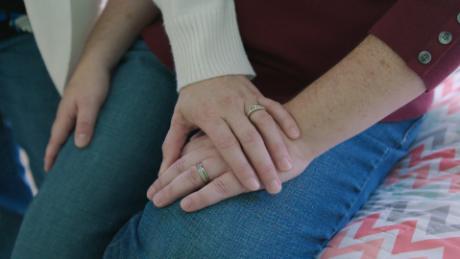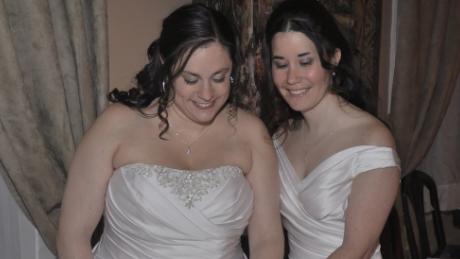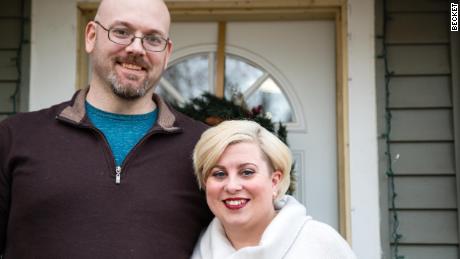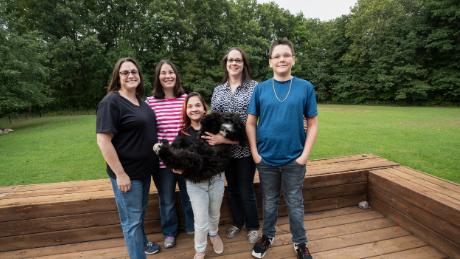The Michigan couple has been together for 12 years and married for seven. Both women have stable careers and loving families. They want to share their good fortune with children in state foster care with the goal of adopting. They even bought a new home in a good school district and two extra bedrooms in Lansing's suburbs to prepare. But when the Dumonts contacted two child welfare agencies in 2016 and 2017 to become certified foster parents, they say the agencies told them they don't work with same-sex couples, citing religious beliefs."They just didn't get to know us at all. It was just one little thing — that we're two women together — and that was it," Kristy Dumont said.Michigan is one of 10 states that allow child welfare agencies to act in accordance with their religious beliefs, even if those beliefs mean refusing to work with same-sex couples. In all but one of those states — Alabama — the laws protect organizations that receive taxpayer funds to perform services on the state's behalf, such as screening prospective parents to care for foster children or finding homes for foster children. Supporters of the laws say they are necessary to ensure that faith-based child welfare agencies can keep their doors open and help children in need. They point out that the laws do not prevent same-sex couples from fostering or adopting through other child welfare agencies, including religious groups that do not object to same-sex relationships.But opponents of religious exemptions — including many child welfare organizations, faith groups and civil rights groups — call them state-sponsored discrimination. Because research shows that same-sex couples are more likely to be raising adopted or foster children than different-sex couples, critics say the laws hurt children by cutting them off from a pool of prospective parents when need far exceeds demand."What all these laws do at their core is let agencies make placement decisions based on religious beliefs with impunity. And they can't have their license or funding revoked for doing so," said attorney Shelbi D. Day with the Family Equality Council, which is part of a coalition that opposes the policies. The goal of the foster care system is to restore stability to a child's life by finding them a forever home. According to US government data, nearly 438,000 children are in foster care on any given day. On average, children remain in state care for nearly two years.When children can't return to their parents or guardians, states often turn to private agencies for help placing them, including faith-based groups, who have a long tradition of providing child care services as part of their ministries. Asking faith-based organizations to operate in defiance of their beliefs is effectively asking them to abandon their mission, said Sandy Furnell, spokesman for Miracle Hill Ministries, a Christian nonprofit that provides child welfare services in South Carolina. "That's what makes them who they are — that's what makes them a religious organization," she said. "If they cannot operate according to their religious convictions, then they're no longer operating according to their faith."
The goal of the foster care system is to restore stability to a child's life by finding them a forever home. According to US government data, nearly 438,000 children are in foster care on any given day. On average, children remain in state care for nearly two years.When children can't return to their parents or guardians, states often turn to private agencies for help placing them, including faith-based groups, who have a long tradition of providing child care services as part of their ministries. Asking faith-based organizations to operate in defiance of their beliefs is effectively asking them to abandon their mission, said Sandy Furnell, spokesman for Miracle Hill Ministries, a Christian nonprofit that provides child welfare services in South Carolina. "That's what makes them who they are — that's what makes them a religious organization," she said. "If they cannot operate according to their religious convictions, then they're no longer operating according to their faith."
Battles are playing out across the country
South Carolina was one of three states to incorporate religious exemptions measures into its child welfare system in 2018, with Oklahoma and Kansas. Michigan's law took effect in 2015 with the expressed aim of "having as many possible qualified adoption and foster parent agencies," according to the statute's language. "The more qualified agencies taking part in this process, the greater the likelihood that permanent child placement can be achieved." The Dumonts and another same-sex couple sued the state of Michigan to end its practice of letting faith-based contractors use religious criteria to screen couples for foster care. The American Civil Liberties Union is representing them in the lawsuit filed in September 2017 against the state Department of Health and Human Services and Children's Services Agency.The couples say they don't object to the law itself, just the state's implementation of it as it relates to state contractors.  The complaint asks the directors of those agencies to forbid state-contracted, taxpayer-funded agencies from disqualifying prospective families based on religious beliefs. They allege that the refusal of faith-based, state-funded child welfare agencies to consider them as prospective parents, based on their sexual orientation, violates their equal protection rights and amounts to the state's endorsement of those religious beliefs."The bigger point is that we now have a system where Christian people get a choice of, say, 100 agencies and everyone else — not just LGBTQ people — have to settle for a subset," said Leslie Cooper, deputy director of the ACLU LGBT & HIV Project, who is representing the Dumonts. "The idea that one group gets fuller choice, and another has to settle for a subset, that's contrary to this country's values and constitutional traditions." Their lawsuit is playing out against a national backdrop of similar conflicts weighing the rights of faith-based organizations contracted by government agencies — with varying outcomes. And same-sex couples aren't the only people who are impacted. Earlier this year, Miracle Hill — which receives state and federal funding — turned away a Jewish woman seeking to mentor children in foster care because she did not share the organization's religious beliefs. Miracle Hill stands by its actions, Furnell said. In early 2018, Miracle Hill challenged the state's efforts to prevent it from only recruiting families who "share its nondenominational Christian religious beliefs." Miracle Hill described the Department of Social Services' efforts to enforce its interpretation of federal nondiscrimination laws as a threat to the nonprofit's religious liberty that would force it to end foster care services.South Carolina Gov. Henry McMaster sided with Miracle Hill and signed an executive order directing the state Department of Health and Human Services to ensure that it does not penalize faith-based agencies for acting on their beliefs. McMaster also asked the US Department of Health and Human Services to waive regulations for faith-based child welfare agencies in South Carolina that prevent federally funded child welfare agencies from discriminating based on religion and sexual orientation. Weeks later, a group of US senators asked HHS to rescind the rule. Miracle Hill said the governor's action and the state legislative proviso provided it with "temporary protection for our religious liberty" while it awaits clarification from HHS on the governor's request. "Our foster care program is currently operating under a provisional license from the SC Department of Social Services because the state is also awaiting clarification from HHS," President and CEO Reid Lehman said.Lawmakers introduced a bill in July that would have let HHS cut 15% of a state's federal funding for child welfare services if the state penalized a child welfare agency for acting on its religious beliefs. Congress passed a funding bill in September that did not include the amendment.Meanwhile, nine states and the nation's capital have laws that forbid discrimination by foster care agencies and officials. At least one of those policies is under attack in Philadelphia, where a faith-based agency sued the city over its nondiscrimination requirement. Catholic Social Services lost the suit in July when a federal judge ruled in favor of Philadelphia, saying the state-contracted agency must comply with the city's anti-discrimination law. The agency appealed in July. In August, the US Supreme Court declined to hear the case.
The complaint asks the directors of those agencies to forbid state-contracted, taxpayer-funded agencies from disqualifying prospective families based on religious beliefs. They allege that the refusal of faith-based, state-funded child welfare agencies to consider them as prospective parents, based on their sexual orientation, violates their equal protection rights and amounts to the state's endorsement of those religious beliefs."The bigger point is that we now have a system where Christian people get a choice of, say, 100 agencies and everyone else — not just LGBTQ people — have to settle for a subset," said Leslie Cooper, deputy director of the ACLU LGBT & HIV Project, who is representing the Dumonts. "The idea that one group gets fuller choice, and another has to settle for a subset, that's contrary to this country's values and constitutional traditions." Their lawsuit is playing out against a national backdrop of similar conflicts weighing the rights of faith-based organizations contracted by government agencies — with varying outcomes. And same-sex couples aren't the only people who are impacted. Earlier this year, Miracle Hill — which receives state and federal funding — turned away a Jewish woman seeking to mentor children in foster care because she did not share the organization's religious beliefs. Miracle Hill stands by its actions, Furnell said. In early 2018, Miracle Hill challenged the state's efforts to prevent it from only recruiting families who "share its nondenominational Christian religious beliefs." Miracle Hill described the Department of Social Services' efforts to enforce its interpretation of federal nondiscrimination laws as a threat to the nonprofit's religious liberty that would force it to end foster care services.South Carolina Gov. Henry McMaster sided with Miracle Hill and signed an executive order directing the state Department of Health and Human Services to ensure that it does not penalize faith-based agencies for acting on their beliefs. McMaster also asked the US Department of Health and Human Services to waive regulations for faith-based child welfare agencies in South Carolina that prevent federally funded child welfare agencies from discriminating based on religion and sexual orientation. Weeks later, a group of US senators asked HHS to rescind the rule. Miracle Hill said the governor's action and the state legislative proviso provided it with "temporary protection for our religious liberty" while it awaits clarification from HHS on the governor's request. "Our foster care program is currently operating under a provisional license from the SC Department of Social Services because the state is also awaiting clarification from HHS," President and CEO Reid Lehman said.Lawmakers introduced a bill in July that would have let HHS cut 15% of a state's federal funding for child welfare services if the state penalized a child welfare agency for acting on its religious beliefs. Congress passed a funding bill in September that did not include the amendment.Meanwhile, nine states and the nation's capital have laws that forbid discrimination by foster care agencies and officials. At least one of those policies is under attack in Philadelphia, where a faith-based agency sued the city over its nondiscrimination requirement. Catholic Social Services lost the suit in July when a federal judge ruled in favor of Philadelphia, saying the state-contracted agency must comply with the city's anti-discrimination law. The agency appealed in July. In August, the US Supreme Court declined to hear the case.
'I didn't expect it to hurt as much as it did'
 The Dumonts met in 2006 and married five years later in Vermont, one of a few states where same-sex marriage was legal at the time. But they never seriously considered becoming parents until same-sex marriage became legal nationwide in 2015.Before then, the Dumonts feared the lack of legal protections for LGBTQ Americans could have unforeseeable consequences for their parental rights should anything happen to one of them.A random email in 2016 from the state Department of Health and Human Services seeking foster parents made the couple consider the idea seriously. They were touched by the children's stories and startled by the scope of need described on the state's website. In Michigan, at the time, there were 13,000 children in foster care and 300 children in need of an adoptive family. They did more research and learned the basic truths of foster care. For one, there are always more children in need of placements than available homes. And the more a child bounces from one placement to the next, the less likely it becomes that the child will find a forever home. Meanwhile, the likelihood of developing behavioral problems and low self-esteem grows, which is why older children have a harder time finding placements.Child welfare experts say that most people want to adopt babies or young children. But the Dumonts want to open their home to older children.To prepare, they bought a home in Dimondale near the Grand River with a fenced-in yard. Then, in 2016 and 2017, they called two agencies in Lansing that offered classes for becoming certified foster parents, Bethany Christian Services and St. Vincent Catholic Charities.
The Dumonts met in 2006 and married five years later in Vermont, one of a few states where same-sex marriage was legal at the time. But they never seriously considered becoming parents until same-sex marriage became legal nationwide in 2015.Before then, the Dumonts feared the lack of legal protections for LGBTQ Americans could have unforeseeable consequences for their parental rights should anything happen to one of them.A random email in 2016 from the state Department of Health and Human Services seeking foster parents made the couple consider the idea seriously. They were touched by the children's stories and startled by the scope of need described on the state's website. In Michigan, at the time, there were 13,000 children in foster care and 300 children in need of an adoptive family. They did more research and learned the basic truths of foster care. For one, there are always more children in need of placements than available homes. And the more a child bounces from one placement to the next, the less likely it becomes that the child will find a forever home. Meanwhile, the likelihood of developing behavioral problems and low self-esteem grows, which is why older children have a harder time finding placements.Child welfare experts say that most people want to adopt babies or young children. But the Dumonts want to open their home to older children.To prepare, they bought a home in Dimondale near the Grand River with a fenced-in yard. Then, in 2016 and 2017, they called two agencies in Lansing that offered classes for becoming certified foster parents, Bethany Christian Services and St. Vincent Catholic Charities. The Dumonts say they chose the two agencies closest to their home that they were eligible to work with. In one call, the person on the other line immediately told them the agency does not work with same-sex couples, they said. A person from the other agency called them back to deliver the news. Kristy Dumont knew in the back of her mind that Michigan had passed religious exemption laws in 2015, she says. "I guess some part of me thought it wouldn't happen to us. It was hard to have it happen, actually see it in practice." It was her first time experiencing discrimination firsthand, she said. "I didn't expect it to hurt as much as it did."
The Dumonts say they chose the two agencies closest to their home that they were eligible to work with. In one call, the person on the other line immediately told them the agency does not work with same-sex couples, they said. A person from the other agency called them back to deliver the news. Kristy Dumont knew in the back of her mind that Michigan had passed religious exemption laws in 2015, she says. "I guess some part of me thought it wouldn't happen to us. It was hard to have it happen, actually see it in practice." It was her first time experiencing discrimination firsthand, she said. "I didn't expect it to hurt as much as it did."
The state's position: Religious freedom opens more homes to children
The state of Michigan declined to comment on the lawsuit, citing the pending litigation. In its motion to dismiss the couples' complaint, it defends the state law, which says the government may not take adverse action against an agency for conduct in accordance with its religious beliefs."If faith-based agencies are not allowed to operate according to their religious principles, they will shut down, which can have the effect of reducing the number of available families. Such a result will do nothing to help a single child find a home," the motion says. The state argues that the Dumonts are free to work with any other agency in neighboring Ingham County, which has six agencies, conceding that Eaton County where the Dumonts live has none. There are 108 child placing agencies in Michigan, and the Dumonts "only called two, and (when) they were referred elsewhere they stopped," the motion states. The state claims that contracting with as many third-party agencies as possible advances secular interests, allowing more services for children to flourish by accommodating faith-based and non-faith-based agencies. But "the mere receipt of funding" does not make an agency a state actor, the motion states. Therefore, the state argues, "Plaintiffs are in effect complaining about the actions of private actors, whom Plaintiffs have not sued, and whose actions are not attributable to Defendants." Bethany Christian Services declined to comment for this story, citing pending litigation. St. Vincent Catholic Charities asked to join the lawsuit to represent its interests.St. Vincent is not opposed to placing children with same-sex couples, said lawyer Mark Rienzi. It's the home study and licensing that infringes on the agency's religious beliefs by requiring staff to visit a prospective family's home and evaluate their relationship. "As a Catholic organization, St. Vincent cannot provide a written recommendation to the State evaluating and endorsing a family situation that would conflict with its religious beliefs," said Lori Windham, Rienzi's co-counsel from the Becket Fund for Religious Liberty."Placing a child with a family that is already certified by another agency, however, does not require St. Vincent to evaluate or endorse family situations that violate its sincerely held religious beliefs."The agency is happy to refer same-sex couples to other agencies, Rienzi added. "They are not stopping anyone from fostering or adopting," he said.
Bethany Christian Services declined to comment for this story, citing pending litigation. St. Vincent Catholic Charities asked to join the lawsuit to represent its interests.St. Vincent is not opposed to placing children with same-sex couples, said lawyer Mark Rienzi. It's the home study and licensing that infringes on the agency's religious beliefs by requiring staff to visit a prospective family's home and evaluate their relationship. "As a Catholic organization, St. Vincent cannot provide a written recommendation to the State evaluating and endorsing a family situation that would conflict with its religious beliefs," said Lori Windham, Rienzi's co-counsel from the Becket Fund for Religious Liberty."Placing a child with a family that is already certified by another agency, however, does not require St. Vincent to evaluate or endorse family situations that violate its sincerely held religious beliefs."The agency is happy to refer same-sex couples to other agencies, Rienzi added. "They are not stopping anyone from fostering or adopting," he said.  The religious agencies have rights, too, he said. So do other foster parents who support St. Vincent's faith-based mission, who would be cut off from its support services if St. Vincent has to close, he said. Melissa Buck is one of those people. She is concerned that if the Dumonts prevail, St. Vincent will close its doors, depriving her of the ability to foster more children. She and her husband adopted five special needs children through St. Vincent, and they continue to rely on them for counseling for the children and other support services, such as dealing with birth parents. "When you decide to foster and adopt you need a group of people around you that will be able to walk that journey with you," Buck said in a phone interview. "They have supported us every step of the way, and it doesn't end when the judge bangs a gavel and the kids have your last name." Rienzi said there are other agencies the couple could work with. But that's not the point, the Dumonts say. The lawsuit isn't just about them anymore. They say it's about ensuring that children have access to a bigger pool of prospective parents and making sure that all same-sex couples have the same access as everyone to taxpayer-funded services.
The religious agencies have rights, too, he said. So do other foster parents who support St. Vincent's faith-based mission, who would be cut off from its support services if St. Vincent has to close, he said. Melissa Buck is one of those people. She is concerned that if the Dumonts prevail, St. Vincent will close its doors, depriving her of the ability to foster more children. She and her husband adopted five special needs children through St. Vincent, and they continue to rely on them for counseling for the children and other support services, such as dealing with birth parents. "When you decide to foster and adopt you need a group of people around you that will be able to walk that journey with you," Buck said in a phone interview. "They have supported us every step of the way, and it doesn't end when the judge bangs a gavel and the kids have your last name." Rienzi said there are other agencies the couple could work with. But that's not the point, the Dumonts say. The lawsuit isn't just about them anymore. They say it's about ensuring that children have access to a bigger pool of prospective parents and making sure that all same-sex couples have the same access as everyone to taxpayer-funded services. US District Judge Paul Borman denied motions to dismiss the Dumonts' lawsuit from St. Vincent and DHHS, paving the way for a trial if the case doesn't settle before then. In his September ruling, he noted that the Dumonts "are not seeking the services of any particular child placing agency." Instead, "they seek the opportunity to adopt a child based on the same criteria applied to every other family seeking to adopt in Michigan.""If they are granted the relief they seek, those barriers will be eliminated, and they will be able to pursue adoption on equal footing with other Michigan families. No speculative inferences are necessary here to conclude that the relief requested will result in the Plaintiffs receiving the dignity and equal treatment they seek."
US District Judge Paul Borman denied motions to dismiss the Dumonts' lawsuit from St. Vincent and DHHS, paving the way for a trial if the case doesn't settle before then. In his September ruling, he noted that the Dumonts "are not seeking the services of any particular child placing agency." Instead, "they seek the opportunity to adopt a child based on the same criteria applied to every other family seeking to adopt in Michigan.""If they are granted the relief they seek, those barriers will be eliminated, and they will be able to pursue adoption on equal footing with other Michigan families. No speculative inferences are necessary here to conclude that the relief requested will result in the Plaintiffs receiving the dignity and equal treatment they seek."
Original Article
The Michigan couple has been together for 12 years and married for seven. Both women have stable careers and loving families. They want to share their good fortune with children in state foster care with the goal of adopting. They even bought a new home in a good school district and two extra bedrooms in Lansing's suburbs to prepare. But when the Dumonts contacted two child welfare agencies in 2016 and 2017 to become certified foster parents, they say the agencies told them they don't work with same-sex couples, citing religious beliefs."They just didn't get to know us at all. It was just one little thing — that we're two women together — and that was it," Kristy Dumont said.Michigan is one of 10 states that allow child welfare agencies to act in accordance with their religious beliefs, even if those beliefs mean refusing to work with same-sex couples. In all but one of those states — Alabama — the laws protect organizations that receive taxpayer funds to perform services on the state's behalf, such as screening prospective parents to care for foster children or finding homes for foster children. Supporters of the laws say they are necessary to ensure that faith-based child welfare agencies can keep their doors open and help children in need. They point out that the laws do not prevent same-sex couples from fostering or adopting through other child welfare agencies, including religious groups that do not object to same-sex relationships.But opponents of religious exemptions — including many child welfare organizations, faith groups and civil rights groups — call them state-sponsored discrimination. Because research shows that same-sex couples are more likely to be raising adopted or foster children than different-sex couples, critics say the laws hurt children by cutting them off from a pool of prospective parents when need far exceeds demand."What all these laws do at their core is let agencies make placement decisions based on religious beliefs with impunity. And they can't have their license or funding revoked for doing so," said attorney Shelbi D. Day with the Family Equality Council, which is part of a coalition that opposes the policies. The goal of the foster care system is to restore stability to a child's life by finding them a forever home. According to US government data, nearly 438,000 children are in foster care on any given day. On average, children remain in state care for nearly two years.When children can't return to their parents or guardians, states often turn to private agencies for help placing them, including faith-based groups, who have a long tradition of providing child care services as part of their ministries. Asking faith-based organizations to operate in defiance of their beliefs is effectively asking them to abandon their mission, said Sandy Furnell, spokesman for Miracle Hill Ministries, a Christian nonprofit that provides child welfare services in South Carolina. "That's what makes them who they are — that's what makes them a religious organization," she said. "If they cannot operate according to their religious convictions, then they're no longer operating according to their faith."
The goal of the foster care system is to restore stability to a child's life by finding them a forever home. According to US government data, nearly 438,000 children are in foster care on any given day. On average, children remain in state care for nearly two years.When children can't return to their parents or guardians, states often turn to private agencies for help placing them, including faith-based groups, who have a long tradition of providing child care services as part of their ministries. Asking faith-based organizations to operate in defiance of their beliefs is effectively asking them to abandon their mission, said Sandy Furnell, spokesman for Miracle Hill Ministries, a Christian nonprofit that provides child welfare services in South Carolina. "That's what makes them who they are — that's what makes them a religious organization," she said. "If they cannot operate according to their religious convictions, then they're no longer operating according to their faith."
Battles are playing out across the country
South Carolina was one of three states to incorporate religious exemptions measures into its child welfare system in 2018, with Oklahoma and Kansas. Michigan's law took effect in 2015 with the expressed aim of "having as many possible qualified adoption and foster parent agencies," according to the statute's language. "The more qualified agencies taking part in this process, the greater the likelihood that permanent child placement can be achieved." The Dumonts and another same-sex couple sued the state of Michigan to end its practice of letting faith-based contractors use religious criteria to screen couples for foster care. The American Civil Liberties Union is representing them in the lawsuit filed in September 2017 against the state Department of Health and Human Services and Children's Services Agency.The couples say they don't object to the law itself, just the state's implementation of it as it relates to state contractors.  The complaint asks the directors of those agencies to forbid state-contracted, taxpayer-funded agencies from disqualifying prospective families based on religious beliefs. They allege that the refusal of faith-based, state-funded child welfare agencies to consider them as prospective parents, based on their sexual orientation, violates their equal protection rights and amounts to the state's endorsement of those religious beliefs."The bigger point is that we now have a system where Christian people get a choice of, say, 100 agencies and everyone else — not just LGBTQ people — have to settle for a subset," said Leslie Cooper, deputy director of the ACLU LGBT & HIV Project, who is representing the Dumonts. "The idea that one group gets fuller choice, and another has to settle for a subset, that's contrary to this country's values and constitutional traditions." Their lawsuit is playing out against a national backdrop of similar conflicts weighing the rights of faith-based organizations contracted by government agencies — with varying outcomes. And same-sex couples aren't the only people who are impacted. Earlier this year, Miracle Hill — which receives state and federal funding — turned away a Jewish woman seeking to mentor children in foster care because she did not share the organization's religious beliefs. Miracle Hill stands by its actions, Furnell said. In early 2018, Miracle Hill challenged the state's efforts to prevent it from only recruiting families who "share its nondenominational Christian religious beliefs." Miracle Hill described the Department of Social Services' efforts to enforce its interpretation of federal nondiscrimination laws as a threat to the nonprofit's religious liberty that would force it to end foster care services.South Carolina Gov. Henry McMaster sided with Miracle Hill and signed an executive order directing the state Department of Health and Human Services to ensure that it does not penalize faith-based agencies for acting on their beliefs. McMaster also asked the US Department of Health and Human Services to waive regulations for faith-based child welfare agencies in South Carolina that prevent federally funded child welfare agencies from discriminating based on religion and sexual orientation. Weeks later, a group of US senators asked HHS to rescind the rule. Miracle Hill said the governor's action and the state legislative proviso provided it with "temporary protection for our religious liberty" while it awaits clarification from HHS on the governor's request. "Our foster care program is currently operating under a provisional license from the SC Department of Social Services because the state is also awaiting clarification from HHS," President and CEO Reid Lehman said.Lawmakers introduced a bill in July that would have let HHS cut 15% of a state's federal funding for child welfare services if the state penalized a child welfare agency for acting on its religious beliefs. Congress passed a funding bill in September that did not include the amendment.Meanwhile, nine states and the nation's capital have laws that forbid discrimination by foster care agencies and officials. At least one of those policies is under attack in Philadelphia, where a faith-based agency sued the city over its nondiscrimination requirement. Catholic Social Services lost the suit in July when a federal judge ruled in favor of Philadelphia, saying the state-contracted agency must comply with the city's anti-discrimination law. The agency appealed in July. In August, the US Supreme Court declined to hear the case.
The complaint asks the directors of those agencies to forbid state-contracted, taxpayer-funded agencies from disqualifying prospective families based on religious beliefs. They allege that the refusal of faith-based, state-funded child welfare agencies to consider them as prospective parents, based on their sexual orientation, violates their equal protection rights and amounts to the state's endorsement of those religious beliefs."The bigger point is that we now have a system where Christian people get a choice of, say, 100 agencies and everyone else — not just LGBTQ people — have to settle for a subset," said Leslie Cooper, deputy director of the ACLU LGBT & HIV Project, who is representing the Dumonts. "The idea that one group gets fuller choice, and another has to settle for a subset, that's contrary to this country's values and constitutional traditions." Their lawsuit is playing out against a national backdrop of similar conflicts weighing the rights of faith-based organizations contracted by government agencies — with varying outcomes. And same-sex couples aren't the only people who are impacted. Earlier this year, Miracle Hill — which receives state and federal funding — turned away a Jewish woman seeking to mentor children in foster care because she did not share the organization's religious beliefs. Miracle Hill stands by its actions, Furnell said. In early 2018, Miracle Hill challenged the state's efforts to prevent it from only recruiting families who "share its nondenominational Christian religious beliefs." Miracle Hill described the Department of Social Services' efforts to enforce its interpretation of federal nondiscrimination laws as a threat to the nonprofit's religious liberty that would force it to end foster care services.South Carolina Gov. Henry McMaster sided with Miracle Hill and signed an executive order directing the state Department of Health and Human Services to ensure that it does not penalize faith-based agencies for acting on their beliefs. McMaster also asked the US Department of Health and Human Services to waive regulations for faith-based child welfare agencies in South Carolina that prevent federally funded child welfare agencies from discriminating based on religion and sexual orientation. Weeks later, a group of US senators asked HHS to rescind the rule. Miracle Hill said the governor's action and the state legislative proviso provided it with "temporary protection for our religious liberty" while it awaits clarification from HHS on the governor's request. "Our foster care program is currently operating under a provisional license from the SC Department of Social Services because the state is also awaiting clarification from HHS," President and CEO Reid Lehman said.Lawmakers introduced a bill in July that would have let HHS cut 15% of a state's federal funding for child welfare services if the state penalized a child welfare agency for acting on its religious beliefs. Congress passed a funding bill in September that did not include the amendment.Meanwhile, nine states and the nation's capital have laws that forbid discrimination by foster care agencies and officials. At least one of those policies is under attack in Philadelphia, where a faith-based agency sued the city over its nondiscrimination requirement. Catholic Social Services lost the suit in July when a federal judge ruled in favor of Philadelphia, saying the state-contracted agency must comply with the city's anti-discrimination law. The agency appealed in July. In August, the US Supreme Court declined to hear the case.
'I didn't expect it to hurt as much as it did'
 The Dumonts met in 2006 and married five years later in Vermont, one of a few states where same-sex marriage was legal at the time. But they never seriously considered becoming parents until same-sex marriage became legal nationwide in 2015.Before then, the Dumonts feared the lack of legal protections for LGBTQ Americans could have unforeseeable consequences for their parental rights should anything happen to one of them.A random email in 2016 from the state Department of Health and Human Services seeking foster parents made the couple consider the idea seriously. They were touched by the children's stories and startled by the scope of need described on the state's website. In Michigan, at the time, there were 13,000 children in foster care and 300 children in need of an adoptive family. They did more research and learned the basic truths of foster care. For one, there are always more children in need of placements than available homes. And the more a child bounces from one placement to the next, the less likely it becomes that the child will find a forever home. Meanwhile, the likelihood of developing behavioral problems and low self-esteem grows, which is why older children have a harder time finding placements.Child welfare experts say that most people want to adopt babies or young children. But the Dumonts want to open their home to older children.To prepare, they bought a home in Dimondale near the Grand River with a fenced-in yard. Then, in 2016 and 2017, they called two agencies in Lansing that offered classes for becoming certified foster parents, Bethany Christian Services and St. Vincent Catholic Charities.
The Dumonts met in 2006 and married five years later in Vermont, one of a few states where same-sex marriage was legal at the time. But they never seriously considered becoming parents until same-sex marriage became legal nationwide in 2015.Before then, the Dumonts feared the lack of legal protections for LGBTQ Americans could have unforeseeable consequences for their parental rights should anything happen to one of them.A random email in 2016 from the state Department of Health and Human Services seeking foster parents made the couple consider the idea seriously. They were touched by the children's stories and startled by the scope of need described on the state's website. In Michigan, at the time, there were 13,000 children in foster care and 300 children in need of an adoptive family. They did more research and learned the basic truths of foster care. For one, there are always more children in need of placements than available homes. And the more a child bounces from one placement to the next, the less likely it becomes that the child will find a forever home. Meanwhile, the likelihood of developing behavioral problems and low self-esteem grows, which is why older children have a harder time finding placements.Child welfare experts say that most people want to adopt babies or young children. But the Dumonts want to open their home to older children.To prepare, they bought a home in Dimondale near the Grand River with a fenced-in yard. Then, in 2016 and 2017, they called two agencies in Lansing that offered classes for becoming certified foster parents, Bethany Christian Services and St. Vincent Catholic Charities. The Dumonts say they chose the two agencies closest to their home that they were eligible to work with. In one call, the person on the other line immediately told them the agency does not work with same-sex couples, they said. A person from the other agency called them back to deliver the news. Kristy Dumont knew in the back of her mind that Michigan had passed religious exemption laws in 2015, she says. "I guess some part of me thought it wouldn't happen to us. It was hard to have it happen, actually see it in practice." It was her first time experiencing discrimination firsthand, she said. "I didn't expect it to hurt as much as it did."
The Dumonts say they chose the two agencies closest to their home that they were eligible to work with. In one call, the person on the other line immediately told them the agency does not work with same-sex couples, they said. A person from the other agency called them back to deliver the news. Kristy Dumont knew in the back of her mind that Michigan had passed religious exemption laws in 2015, she says. "I guess some part of me thought it wouldn't happen to us. It was hard to have it happen, actually see it in practice." It was her first time experiencing discrimination firsthand, she said. "I didn't expect it to hurt as much as it did."
The state's position: Religious freedom opens more homes to children
The state of Michigan declined to comment on the lawsuit, citing the pending litigation. In its motion to dismiss the couples' complaint, it defends the state law, which says the government may not take adverse action against an agency for conduct in accordance with its religious beliefs."If faith-based agencies are not allowed to operate according to their religious principles, they will shut down, which can have the effect of reducing the number of available families. Such a result will do nothing to help a single child find a home," the motion says. The state argues that the Dumonts are free to work with any other agency in neighboring Ingham County, which has six agencies, conceding that Eaton County where the Dumonts live has none. There are 108 child placing agencies in Michigan, and the Dumonts "only called two, and (when) they were referred elsewhere they stopped," the motion states. The state claims that contracting with as many third-party agencies as possible advances secular interests, allowing more services for children to flourish by accommodating faith-based and non-faith-based agencies. But "the mere receipt of funding" does not make an agency a state actor, the motion states. Therefore, the state argues, "Plaintiffs are in effect complaining about the actions of private actors, whom Plaintiffs have not sued, and whose actions are not attributable to Defendants." Bethany Christian Services declined to comment for this story, citing pending litigation. St. Vincent Catholic Charities asked to join the lawsuit to represent its interests.St. Vincent is not opposed to placing children with same-sex couples, said lawyer Mark Rienzi. It's the home study and licensing that infringes on the agency's religious beliefs by requiring staff to visit a prospective family's home and evaluate their relationship. "As a Catholic organization, St. Vincent cannot provide a written recommendation to the State evaluating and endorsing a family situation that would conflict with its religious beliefs," said Lori Windham, Rienzi's co-counsel from the Becket Fund for Religious Liberty."Placing a child with a family that is already certified by another agency, however, does not require St. Vincent to evaluate or endorse family situations that violate its sincerely held religious beliefs."The agency is happy to refer same-sex couples to other agencies, Rienzi added. "They are not stopping anyone from fostering or adopting," he said.
Bethany Christian Services declined to comment for this story, citing pending litigation. St. Vincent Catholic Charities asked to join the lawsuit to represent its interests.St. Vincent is not opposed to placing children with same-sex couples, said lawyer Mark Rienzi. It's the home study and licensing that infringes on the agency's religious beliefs by requiring staff to visit a prospective family's home and evaluate their relationship. "As a Catholic organization, St. Vincent cannot provide a written recommendation to the State evaluating and endorsing a family situation that would conflict with its religious beliefs," said Lori Windham, Rienzi's co-counsel from the Becket Fund for Religious Liberty."Placing a child with a family that is already certified by another agency, however, does not require St. Vincent to evaluate or endorse family situations that violate its sincerely held religious beliefs."The agency is happy to refer same-sex couples to other agencies, Rienzi added. "They are not stopping anyone from fostering or adopting," he said.  The religious agencies have rights, too, he said. So do other foster parents who support St. Vincent's faith-based mission, who would be cut off from its support services if St. Vincent has to close, he said. Melissa Buck is one of those people. She is concerned that if the Dumonts prevail, St. Vincent will close its doors, depriving her of the ability to foster more children. She and her husband adopted five special needs children through St. Vincent, and they continue to rely on them for counseling for the children and other support services, such as dealing with birth parents. "When you decide to foster and adopt you need a group of people around you that will be able to walk that journey with you," Buck said in a phone interview. "They have supported us every step of the way, and it doesn't end when the judge bangs a gavel and the kids have your last name." Rienzi said there are other agencies the couple could work with. But that's not the point, the Dumonts say. The lawsuit isn't just about them anymore. They say it's about ensuring that children have access to a bigger pool of prospective parents and making sure that all same-sex couples have the same access as everyone to taxpayer-funded services.
The religious agencies have rights, too, he said. So do other foster parents who support St. Vincent's faith-based mission, who would be cut off from its support services if St. Vincent has to close, he said. Melissa Buck is one of those people. She is concerned that if the Dumonts prevail, St. Vincent will close its doors, depriving her of the ability to foster more children. She and her husband adopted five special needs children through St. Vincent, and they continue to rely on them for counseling for the children and other support services, such as dealing with birth parents. "When you decide to foster and adopt you need a group of people around you that will be able to walk that journey with you," Buck said in a phone interview. "They have supported us every step of the way, and it doesn't end when the judge bangs a gavel and the kids have your last name." Rienzi said there are other agencies the couple could work with. But that's not the point, the Dumonts say. The lawsuit isn't just about them anymore. They say it's about ensuring that children have access to a bigger pool of prospective parents and making sure that all same-sex couples have the same access as everyone to taxpayer-funded services. US District Judge Paul Borman denied motions to dismiss the Dumonts' lawsuit from St. Vincent and DHHS, paving the way for a trial if the case doesn't settle before then. In his September ruling, he noted that the Dumonts "are not seeking the services of any particular child placing agency." Instead, "they seek the opportunity to adopt a child based on the same criteria applied to every other family seeking to adopt in Michigan.""If they are granted the relief they seek, those barriers will be eliminated, and they will be able to pursue adoption on equal footing with other Michigan families. No speculative inferences are necessary here to conclude that the relief requested will result in the Plaintiffs receiving the dignity and equal treatment they seek."
US District Judge Paul Borman denied motions to dismiss the Dumonts' lawsuit from St. Vincent and DHHS, paving the way for a trial if the case doesn't settle before then. In his September ruling, he noted that the Dumonts "are not seeking the services of any particular child placing agency." Instead, "they seek the opportunity to adopt a child based on the same criteria applied to every other family seeking to adopt in Michigan.""If they are granted the relief they seek, those barriers will be eliminated, and they will be able to pursue adoption on equal footing with other Michigan families. No speculative inferences are necessary here to conclude that the relief requested will result in the Plaintiffs receiving the dignity and equal treatment they seek."
Original Article











